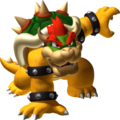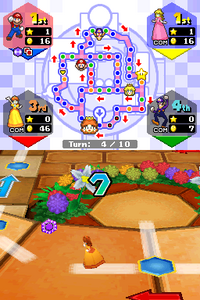Mario Party DS: Difference between revisions
m (→Spaces) |
(→Spaces: If debt existed in Mario Party, then what I just put in here would be kinda redundant.) |
||
| Line 195: | Line 195: | ||
* '''Gimme Coins!:''' The player gives 20 coins to Bowser. Sometimes, the player gives 10 coins instead. | * '''Gimme Coins!:''' The player gives 20 coins to Bowser. Sometimes, the player gives 10 coins instead. | ||
* If the player does not have 20, Bowser takes 10 coins away instead. | * If the player does not have 20, Bowser takes 10 coins away instead. | ||
* If the player has less than 10 coins, Bowser takes all of the player's coins anyway. | |||
* '''Gimme Stars!:''' Bowser takes one star from the player. | * '''Gimme Stars!:''' Bowser takes one star from the player. | ||
* '''Gimme Charity!:''' Bowser forces the player to give 10 coins to all opponents. | * '''Gimme Charity!:''' Bowser forces the player to give 10 coins to all opponents. | ||
Revision as of 18:59, August 17, 2017
Template:Infobox Mario Party DS is the eleventh installment in the Mario Party series (thirteenth in Japan), the second for the handheld consoles (the first being Mario Party Advance for the Game Boy Advance, third being Mario Party: Island Tour for the Nintendo 3DS and fourth being Mario Party: Star Rush for the Nintendo 3DS), and the only one for the Nintendo DS. It was released in Japan on November 8, 2007, in North America on November 19, 2007, in Europe on November 23, 2007, and in Oceania on December 6, 2007. This is the last Mario Party game to be developed by Hudson Soft, who was succeeded by Nd Cube in 2012. This Mario Party game is unique for having the characters to be shrunken down to a very small size and competing in a "mega world" for the majority of the game. It includes more than seventy new minigames and five new game boards. Its functions include touch control, microphone control and dual-screen challenges. It is possible for up to four players to play in wireless mode using only one game card.
Story
One night in the Mushroom Kingdom, five Sky Crystals in the sky fall to the land. One falls near Mario, who explains it to his friends the next day. Suddenly, Kamek flies overhead the gang, dropping inviations to a feast in Bowser's Castle to apologize for his wicked behavior. Unintentionally, Donkey Kong and Diddy Kong get invitations as well.
Curious, the crew sets off for the castle, but upon their arrival, they find it was a trick as Bowser and Bowser Jr. trap Mario and friends in a cage when they enter. With the group trapped, Bowser uses a magic wand called the Minimizer to shrink them all down to the size of chess pieces, and they are thrown out to a distant location by Kamek. This leaves Bowser to look for the five shining objects, the Sky Crystals, in peace. Displeased by the outcome, the gang decides to head for the castle to settle the score with Bowser. The desire to be the one Superstar that defeats Bowser and his cronies causes Mario and his other seven friends to pit themselves against each other for the title along the way.
At the beginning of their journey, Wiggler begs the crew for help, as a Piranha Plant has infested his garden. The Piranha Plant is eventually defeated by the character who becomes the Superstar, leading to Wiggler rewarding them with a Sky Crystal that landed in his garden.
Soon after, Toadette finds and requests the group to defeat a Hammer Bro that was abusing her instruments in her music room. The Hammer Bro is defeated in a drum-off by the Superstar, Toadette giving a Sky Crystal she found to the gang as her thanks.
Afterwards, they set off for the jungle, where they find Diddy Kong, who shows the heroes that Donkey Kong was turned to stone by a Dry Bones. The Superstar manages to defeat Dry Bones in his arena, leading to Donkey Kong's restoration and Diddy Kong rewarding them with a Sky Crystal he found. Donkey Kong and Diddy Kong quickly recall the free food promised at Bowser's Castle, and eagerly head off towards the castle.
Upon nearing the castle, the crew find a Koopa Troopa from a library asking for help, as Kamek has trapped his grandfather, Koopa Krag, in one of his library books. The Superstar defeats Kamek at the end of a long hallway, and Koopa Krag is freed from the book, giving them a Sky Crystal as thanks.
Eventually, they reach Bowser's Castle, where they are promptly stuffed in a pinball machine by Bowser and Bowser Jr., the latter using it to mess with them. The one revealed to be the Superstar is taken from the pinball machine to be shrunk again and crushed by Bowser, but Donkey Kong and Diddy Kong arrive, the former unintentionally smashing the Minimizer by knocking it out of Bowser's hands and stepping on it afterwards, the actions reverting the heroes back to their original states.
Reluctant to give up, Bowser reveals one more surprise: the Megamorph Belt. The device transforms Bowser into Blockhead Bowser, and the aforementioned Superstar does battle with him. Upon Bowser's defeat, Bowser and his son are tied up, Mario taking back the final Sky Crystal he initially found from them. Now in close proximity of each other, they are magically formed together to make a crystal DS, allowing play of Triangle Twisters, the fun challenge mentioned by Bowser, whose desire to have the Sky Crystals being to try the fun challenge. After hearing this, Mario decides to untie the two, and they all play Triangle Twisters together, thus ending the story. Nearby, Donkey Kong and Diddy Kong eat the entire feast by themselves, being quite satisfied.
Characters
Mario Party DS has 8 playable characters and 5 board hosts, with a boss for each board. Other characters with little to no role are also present.
Playable characters
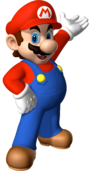
|

|

|

|
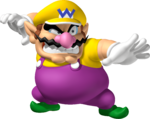
|
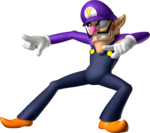
|
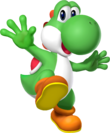
|

|
Board hosts/bosses
Supporting cast
- Donkey Kong (Found in DK's Stone Statue)
- Koopa (Found in Kamek's Library)
- Koopa Krag (Found in Kamek's Library)
- Bowser Jr. (Found in Bowser's Pinball Machine)
Minigame enemies
Team Names
For the Tag Battle setting in Party Mode, each combination of playable characters create one unique Team Name. The list of possible results are shown below:
Modes
- Story Mode (1 Player) - A single player mode that follows the storyline of the game. It puts the player through the five boards of the game, requiring them to win a Battle Royal on each board and defeat the boss of it in a minigame to progress.
- Party Mode (1-4 Players) - The main mode of the game, where the player competes against several human-controlled or computer-controlled players on a party board in either a Battle Royale, Tag Battle or Duel Battle.
- Minigame Mode (1-4 Players) - A mode where the player can play six games that use the pool of minigames available in a variety of challenges that don’t take place on the game boards, those being Free Play, Step It Up, Battle Cup, Score Scuffle, Boss Bash and Rocket Rascals. The player can pit themselves against up to three other human-controlled players in the Multiplayer version of this mode.
- Puzzle Mode (1-2 Players) - A mode where the player can play six puzzle-action games, the majority being classics from previous Mario Party games. This mode introduces the new touch-controlled puzzle game, Triangle Twisters, which offers two play modes, Frenzy Mode and Focus Mode. Additionally, the player can pit themselves against another human-controlled player in the Multiplayer version of this mode.
- Multiplayer (2-4 Players) - Using one game card, players can wirelessly play together in Party Mode, Minigame Mode (2-4 Players), Puzzle Mode and Extra Mode (2 Player) with nearby Nintendo DS users.
- Extras Mode (2 Player) - A multiplayer exclusive mode that includes games designed for two: the cooperative Pen Pals and the competitive Desert Duel.
- Gallery - Includes over 120 collectibles that can be viewed at the player's discretion when unlocked. This mode also allows them to listen to the game's music and watch the cutscenes seen in Story Mode when viewed at least once in it.
Gameplay
The gameplay in Mario Party DS follows the style of the console games that preceded it. Up to four players take turns to roll a Dice Block that shows numbers from 1-10, which decides how far players move across boards. The goal is to acquire the most Stars through the conditions decided on each of the boards. After all players have had their turn, the type of minigame is determined by what color space the player lands on (red or blue). If the player landed on a green, duel or friend space, the player's color is randomly red or blue. Landing on a Bowser space will result in the player's color turning red. For instance, if one player lands on a red space while three other players land on a blue space, a 1 vs. 3 minigame is held, with the red player on the solo side and the three players on the other side. The players then engage in a minigame, and whoever wins the minigame earns 10 coins. The turn will end afterward, the process repeating until the set number of turns have passed. The game will end once the set number of turns have passed, and the total number of Stars and coins the players have collected will be tallied, Stars being the primary factor for rankings while coins are the tie-breakers.
At the end of a Party Mode game, Bonus Stars may be rewarded to the players who have excelled the most at certain criteria. If there is a tie between three or less players, the Stars are awarded to all of the tied players. The following are shown below:
- Mini-Game Star - Awarded to the players who have won the most minigames.
- Happening Star - Awarded to the players who have landed on the most ? Spaces.
- Running Star - Awarded to the players who have moved the most spaces using Dice Blocks.
- Item Star - Awarded to the players who used the most items.
- Hex Star - Awarded to the players who laid down the most hexes.
- Friendship Star - Awarded to the players who landed on the most Friend Spaces.
Spaces
| Space | Image | Description |
|---|---|---|
| Blue Space | File:MPDSBlueSpace.PNG | The most common space, the Blue Space gives players three coins if they land on it. It gives their section in the heads up display a blue color, which is used to determine pairings in minigames. |
| Red Space | File:MPDSRedSpace.PNG | A fairly common space, the Red Space takes three coins from players that land on it. It gives their section in the heads up display a red color, which is used to determine pairings in minigames. |
| Green Space | File:MPDSHappSpace.PNG | This space causes certain events to happen that can benefit the player, harm the player, benefit a number of players, or harm a number of players. It gives the player's section in the heads up display a green color, which is used to determine pairings in minigames. In this case, the green color eventually flashes to red or blue. |
| Friend Space | File:MPDSFriendSpace.PNG | When they land on this space in Battle Royale, players can select one opponent to be a friend. Both then receive 5 coins. In Team Battle, the player and one of the two opponents get 5 coins. It gives the player's section in the heads up display a green color, which is used to determine pairings in minigames. |
| Duel Space | File:MPDSDuelSpace.PNG | Engages with an opponent of the player's choice into a duel minigame. The winner gets to use a roulette that determines the reward from the opponent. It gives the player's section in the heads up display a green color, which is used to determine pairings in minigames. It replaces the Friend Space in the Final 5 Frenzy. |
| Bowser Space | File:MPDSBowserSpace.PNG | Any players that land here causes Bowser to arrive. Bowser causes a series of events that harms usually whoever landed on the space. It gives their section in the heads up display a red color, which is used to determine pairings in minigames. Bowser can cause these events:
|
| Star Space | Once players reach this space, they can pay 20 coins to receive a Star. Other boards may have different conditions players need to fulfill to earn a Star. Unlike other spaces, this space cannot be landed on (unless a Star spawns directly on a player), and this space does not subtract from the dice roll. |
Items
Alongside normal items seen in earlier Mario Party console titles, Mario Party DS introduces a new type of item that is also used during board gameplay: Hexes. The normal items are most often acquired through purchase at an Item Shop, and may be used by players to gain an advantage. Alternatively, Hexes can be found only at Hex Areas and can be placed on the board to usually hinder the player who lands on the space where it was set. Each player may only carry three items/hexes at one time.
Normal items
Mario Party DS is the first Mario Party game to have standard items since Mario Party 4. These items can be bought at shops on each board, run by a Monty Mole. In addition, for the first time players can purchase more than one item in one stop.
| Item | Image | Description | Shop Price |
|---|---|---|---|
| Double Dice Set | 
|
Allows the player to roll two Dice Blocks. | 3 Coins |
| Triple Dice Set | 
|
Same as the Double Dice Set, but with three Dice Blocks. | 7 Coins |
| Halfway Dice Block | 
|
Allows the player to roll a Dice Block with the numbers 1 through 5. | 1 Coin |
| Warp Dice Block | 
|
Causes the player to warp to a random space on the board, then roll. | 2 Coins |
| Snag Bag | 
|
Allows the player to steal a random item from an opponent of their choice. | 8 Coins |
| Star Pipe | 
|
Warps the player directly to the Star Space, allowing them to buy the Star if they wish and if they have 20 coins, then roll. | 15 Coins |
| Block Sensor | 
|
Causes the next space the player lands upon to contain a Hidden Block. | 20 Coins |
| Grab Bag | 
|
Removes all the player's current items and hexes and gives them a Star Pipe, Block Sensor, and Triple Dice Set. | 25 Coins |
Hexes
Hexes are items placed on spaces to usually hinder the player who lands on a set Hex. If a character lands on their own hex, they receive 5 coins, much like landing on their own Character Space in previous Mario Party games. The only exceptions to this is if the player lands on a Coin Block or Star Block they placed, where they will reap the benefit of the hexes instead. Unlike character spaces, hexes go away after being landed on. Hexes can be replaced by other hexes.
| Name | Image | Description |
|---|---|---|
| 10-Coin Hex | Causes the player who lands on the hex to give ten coins to the one who set it. | |
| 20-Coin Hex | Causes the player who lands on the space to give twenty coins to the player who placed the hex. | |
| Coin Swap Hex | Causes the player who set the hex and the player that lands on it to swap coin totals. | |
| 1-Star Hex | The player who lands on this hex must give one star to the player who set it. | |
| 2-Star Hex | The player who sets this hex steals two stars from the player that lands on it. | |
| Space Swap Hex | Both the player who lands on the hex and the one who placed it swap positions on the board. | |
| Star Block | The player who lands on this hex can hit a block with a 1 through 3 on it to gain that many stars. | |
| Coin Block | The player that lands on this hex is able to hit a block containing coins, by pressing the A button repeatedly, to gain as many as possible in ten seconds. |
Gameboards
| Picture | Name | Description | Boss | Boss Mini-Game |
|---|---|---|---|---|
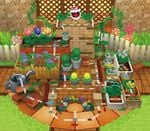
|
Wiggler's Garden | The player must find the star and buy it for 20 coins. Once the player claims the star, it will go to another location. | Piranha Plant
|
Feed and Seed |
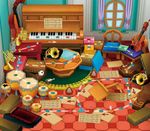
|
Toadette's Music Room | Players must find the Music Notes and buy stars from them for 5-30 coins. | Hammer Bro
|
Hammer Chime |
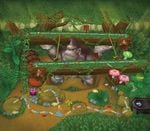
|
DK's Stone Statue | The star on this board is always located on the second-to-last space. Players can buy multiple stars at once on this stage depending on how many coins they have at the time. A star will cost 20 coins. | Dry Bones
|
Hexoskeleton |
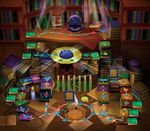
|
Kamek's Library | On this board there are three magic jars to find. The player will need to pay 10 coins to open a magic jar. One contains a star, one 5 coins and the other sends them back to start. This is completely random and will change once someone finds the star. | Kamek
|
Book Bash |
| File:MPDSPinballBoard.PNG | Bowser's Pinball Machine | Players must find the star and buy it for 20 coins. Afterwards, the star moves to a different space. | Bowser
|
Bowser's Block Party |
Minigames
- Main article: List of Mario Party DS minigames
Mario Party DS features 73 minigames from 7 different categories. There are 32 4-player minigames (29 of which are also Duel minigames), 12 1-vs-3 minigames, 13 2-vs-2 minigames (3 of which are also Duel minigames), 5 Battle minigames, 5 Boss minigames and 6 Puzzle minigames. Of these, 58 are unique, 4 are minigames with the goal of collecting coins, and 11 are specialized.
Staff
- Main article: List of Mario Party DS staff
Mario Party DS was worked on by both Hudson Soft and Group No. 4 of the Nintendo SPD. Its game, planning, program, visual, sound and senior directors were Kouji Matsuura, Yuka Sasaki, Hideki Nishmoto, Akhiro Shibata, Ichiro Shimakura and Kenji Kikuchi respectively. Satoru Iwata and Hidetoshi Endo were the game's executive producers.
During the credits the eight playable characters run into view periodically. The player can tap on the characters once they've run into full view on the Touch Screen with the stylus to make the tapped character jump, and can continue to do so for the remainder of the credits.
Collection
- Main article: List of Mario Party DS collectibles
Mario Party DS features a wide variety of collectible items. These range between figurines of the many characters in the game, features of the five boards played on in the game, trophies related to the bosses defeated in the game and various badges one of which the player being allowed to equip. There are 30, 71, 25 and 30 of these respectively, each particular collectible with a different requirement to unlock.
Pre-release and unused content
- Main article: List of Mario Party DS pre-release and unused content
In Mario Party DS, Wiggler's Garden was originally going to be called Petey's Greenhouse, where Petey Piranha would need help as a member of his army, a Piranha Plant, had betrayed him and begun to destroy his greenhouse. Toadsworth was also originally planned to appear as the owner of the item houses, but was replaced by a Monty Mole, although Toadsworth was still mentioned in some collectibles' descriptions in the Gallery.
Gallery
- For this subject's image gallery, see Gallery:Mario Party DS.
- DS Diceblock.png
- MPDS Scene.png
Box artwork
Media
References to other games
- Mario Party 3 to 7: The song "Think It Out", which plays in the Puzzle mini-games, arranges the themes that play in the original versions of those mini-games.
Names in other languages
| Language | Name | Meaning | Notes |
|---|---|---|---|
| Japanese | マリオパーティ DS[?] Mario Pātī DS |
Mario Party DS | |
| Italian | Mario Party DS[?] | - | |
| Korean | 마리오 파티 DS[?] Mario Pati DS |
Mario Party DS | |
| Portuguese | Mario Party DS[?] | - | |
| Spanish | Mario Party DS[?] | - |
Trivia
- This is the first Mario Party since Mario Party 4 to not have any Donkey Kong Spaces.
- The North American manual has a mistake on Page 27. It states that during a 2 Player game (the player vs a CPU opponent or another player), only Battle or Boss minigames can be chosen. In reality, during a 2 Player match, only Duel and Boss minigames can be chosen. This was fixed in the European manual.
- This is the only Mario Party game in which there are no Bonus Stars given out in the Story Mode.
- This is the first and currently only Mario Party game not to have a visible host.
- If a CPU has a Space Swap Hex or a Warp Dice Block, they'll never use it.
- Two minigames, Shuffleboard Showdown and Chips and Dips, were removed in the Korean release, likely because of casino gambling chips.
- The playable characters' profile models and voice clips from Mario Party 8 are reused in this game.
- Artwork for Peach, Daisy, Toadette, and Dry Bones are taken from Mario Party 7, artwork for Toad and Kamek are taken from Super Mario Galaxy, and artwork for Hammer Bro. is taken from New Super Mario Bros. Yoshi's artwork is based off one of his artworks from Super Mario 64 DS, where he is holding Mario's Cap.
- This is one of the four games in the Mario Party series not to introduce new playable characters, with the others being Mario Party Advance, Mario Party 2 and Mario Party-e.
External links
- Mario Party DS Official US Site
- Mario Party DS Official Japanese Site
- Mario Party DS Official European Site



